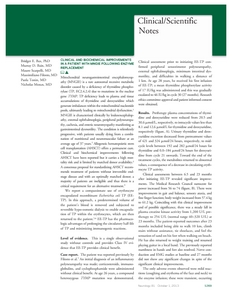Bax, BE; Bain, MD; Scarpelli, M; Filosto, M; Tonin, P; Moran, N
(2013)
Clinical and biochemical improvements in a patient with MNGIE following enzyme replacement.
Neurology, 81 (14).
1269 - 1271.
ISSN 0028-3878
https://doi.org/10.1212/WNL.0b013e3182a6cb4b
SGUL Authors: Bax, Bridget Elizabeth
![[img]](https://openaccess.sgul.ac.uk/107119/14.hassmallThumbnailVersion/Clinical_and_Biomedical_Improvements_Publishers_version.pdf)  Preview |
|
["document_typename_application/pdf; charset=binary" not defined]
Published Version
Download (300kB)
| Preview
|
Abstract
Mitochondrial neurogastrointestinal encephalomyopathy (MNGIE) is a rare autosomal recessive metabolic disorder caused by a deficiency of thymidine phosphorylase (TP, EC2.4.2.4) due to mutations in the nuclear gene TYMP. TP deficiency leads to plasma and tissue accumulations of thymidine and deoxyuridine which generate imbalances within the mitochondrial nucleotide pools, ultimately leading to mitochondrial dysfunction.1 MNGIE is characterized clinically by leukoencephalopathy, external ophthalmoplegia, peripheral polyneuropathy, cachexia, and enteric neuromyopathy manifesting as gastrointestinal dysmotility. The condition is relentlessly progressive, with patients usually dying from a combination of nutritional and neuromuscular failure at an average age of 37 years.2 Allogeneic hematopoietic stem cell transplantation (AHSCT) offers a permanent cure. Clinical and biochemical improvements following AHSCT have been reported but it carries a high mortality risk and is limited by matched donor availability.3 A consensus proposal for standardizing AHSCT recommends treatment of patients without irreversible end-stage disease and with an optimally matched donor; a majority of patients are ineligible and thus there is a critical requirement for an alternative treatment.
| Item Type: |
Article
|
| Additional Information: |
© 2013 American Academy of Neurology. Published version made available with permission from the publisher. |
| Keywords: |
Adult, Blood Transfusion, Autologous, Escherichia coli, Humans, Intestinal Pseudo-Obstruction, Male, Mitochondrial Encephalomyopathies, Thymidine Phosphorylase, Treatment Outcome, Neurology & Neurosurgery, 1103 Clinical Sciences, 1109 Neurosciences, 1702 Cognitive Science, Mitochondrial Encephalomyopathies, Thymidine Phosphorylase, Treatment Outcome |
| SGUL Research Institute / Research Centre: |
Academic Structure > Molecular and Clinical Sciences Research Institute (MCS) > Cell Sciences (INCCCS) |
| Journal or Publication Title: |
Neurology |
| ISSN: |
0028-3878 |
| Related URLs: |
|
| PubMed ID: |
23966250 |
| Web of Science ID: |
23966250 |
| Dates: |
| Date |
Event |
| 2013-10-01 |
Published |
|
 |
Go to PubMed abstract |
| URI: |
https://openaccess.sgul.ac.uk/id/eprint/107119 |
| Publisher's version: |
https://doi.org/10.1212/WNL.0b013e3182a6cb4b |
Statistics
Item downloaded times since 30 Apr 2015.
Actions (login required)
 |
Edit Item |



